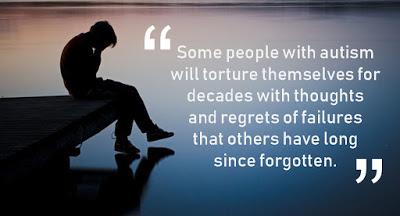In this post, I want to look at why people with autism are so resistant to trying new things and why it's important to keep trying to push the barriers. The strategies that you use to push the barriers are important too and it's critical that you know when to back off and when to add a little push.

Fear of Failure
We all have a fear of failure. Sometimes it's a very real fear of injury or embarrassment but sometimes it's just the fear of failure itself. Many people on the autism spectrum try very hard to achieve "perfection" in their lives and what might seem a simple failure to most people can become a very big deal to them.Some people with autism torture will themselves for decades with thoughts and regrets of "failures" which others have long since forgotten.
There's also the issues of bullying that arise from failure. People with autism are frequently victims of bullying and any public failures on their part are often remembered, or worse, filmed, by bullies for later "torture". These threats are very real.

Increased Chances of Failure (Sensory)
In some ways, people with autism may have an increased likelihood of failure when attempting something new because of their sensory issues and their low muscle tone. If a new activity relies upon strength or some other aspect of physicality, then the hyper-flexibility that some autistic individuals have can lead to easy injury as limbs bend further than they should.If the new activity involves a lot of sensory data, including heights, problem noises or vibrations and touch, their sensory issues can make it more challenging and thus increase the likelihood of failure.
With pressure like this, it's little wonder that so many people on the spectrum simply choose not to participate.
Take a logical approach
While it's tempting to simply "not participate", this isn't really possible in our society and even when it is possible, it's not a very healthy approach. We need to work hard to get ourselves, our children and our friends on the spectrum to expand their horizons and to try new things.The best way to do this is to take a logical approach because people on the spectrum tend to be a little more logical than most and often respond well to reasoned arguments.
These are some of the questions that need to be asked;
- Will doing this activity benefit me?
- What are the risks? Are they excessive? Are they likely?
- What are the consequences of failure?
- What parts of the activity do I fear (all? some?)
- What steps can I take to remove or reduce the fear issues?
- What happens if I don't do this?

Reject Overly Risky Activities
You'll find that if you follow this checklist, it will be easy to reject an overly risky activity.For example; Bungee Jumping
- Will doing this activity benefit me?
Unlikely - What are the risks? Are they excessive? Are they likely?
Very high risk but low likelihood of accident (unless it's at an unsafe site). - What are the consequences of failure?
Death. - What parts of the activity do I fear (all? some?)
Heights - What steps can I take to remove or reduce the fear issues?
Nothing - Bungee Jumping is all about heights. - What happens if I don't do this?
Nothing

Accept Necessary or Beneficial Activities
Similarly, the checklist will help you to identify activities that are beneficial to you, for example, learning to drive a forklift if you work in a warehouse.- Will doing this activity benefit me?
Yes, because I will be able to apply for a promotion and/or different duties. - What are the risks? Are they excessive? Are they likely?
Crashing, possible injury. They're not excessive but there's a reasonable likelihood (at least until you become proficient). - What are the consequences of failure?
Most likely some broken pallets or damaged goods. Work will generally accept this. - What parts of the activity do I fear (all? some?)
Going fast and moving very large loads. - What steps can I take to remove or reduce the fear issues?
Keep to a slow speed and only lift small items until you feel confident. - What happens if I don't do this?
Depending on the job, you may not be able to work or you may not be able to advance.

Remove the consequences
In order to make an activity appear less threatening, you need to look at removing or reducing the consequences. For example, instead of a "test" being about whether or not you get a promotion at work, you need to be doing the test merely for your own satisfaction.If the test is something that is normally done in front of peers or colleagues, then talk to your supervisor or teacher about whether or not you can "have a go" without being watched by all of those people. It probably won't count as the "final result" but it will allow you to fail or succeed on your own terms without having to worry about onlookers or mockery from others.
If you succeed, then you'll gain a lot of confidence. Hopefully enough to repeat the "test" in front of others if required.
Push yourself, gently
In order to do anything new, you need to push yourself just a little into your "anxiety zone". You'll usually know how hard you can push yourself, but the aim is to take on a little bit of discomfort, not to trigger a full-scale meltdown.You always need to have a meltdown plan in place, in case your anxiety levels get the better of you. For most things, this will simply be "stop" if it gets too much. If you can find someone who is familiar with autism and will support you if you need to stop or take a break, this is better. If not, make sure that your supervisor or teacher knows that you're stepping outside of your comfort zone and that you might not be able to complete the activity.
It's always easier to back down if you have someone on your side who understands your situation.
Learn from mistakes
Your forays into new territory won't always be successful. In fact, there's every chance that you'll end up with a few spectacular failures along the way. You need to anticipate these and accept them for what they are.Every failure is an opportunity for learning.

Failures aren't necessarily a reason to give up. Sometimes, they're a reason for you to reassess a situation and think about what you could do better or differently. Sometimes, they're a sign that more preparation is needed or that additional supports are required.
Most of all, failures need to be recognised as a mark of pride, an indication that you attempted to do something that was incredibly difficult and outside of your comfort zone. Give yourself some credit for trying.
Failures shouldn't become barriers and you shouldn't torture yourself by overthinking them. Just decide if and when you're ready to give it another shot and what you need in order to be more effective next time.
Celebrate your successes
Surprisingly, success isn't quite as important as failure. When you succeed at something, it simply works and you can give yourself a pat on the back. You don't learn nearly as much as you do from a failure.Nevertheless, celebrate your successes. Every little success means that you've clawed back a little of the ground on which people say "you can't do that".
Remember; there's no such thing as can't. There's only "not yet". You can do things on your own terms when you're ready.


